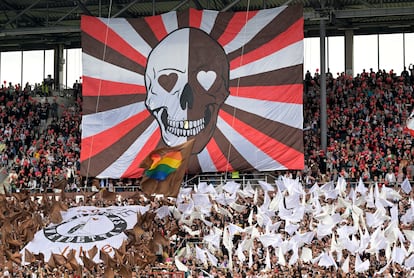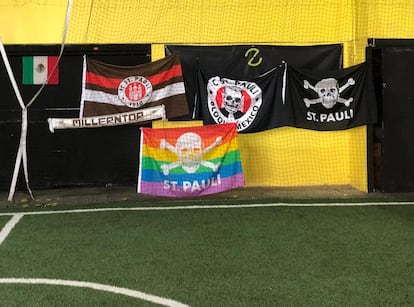St. Pauli, the ‘kult’ team that admires Che Guevara and the Zapatistas, returns to Germany’s soccer elite
Throughout its history the team from Hamburg, known as ‘the most progressive in the world,’ has maintained friendships and cultural ties with several Latin American countries


It seemed to be any given Sunday, but this one was different. The atmosphere was typical at the Millerntor-Stadion in Hamburg, with thousands of brown shirts, flags bearing the pirate skull, and others with the rainbow of the LGBTQI+ community, Palestine, or the famous image of the revolutionary guerrilla Ernesto “Che” Guevara. From a Zapatista performing an overhead kick on top of a red star to an image of two men kissing accompanied by the legend “the only thing that matters is love,” each mural on the stadium walls, a canvas of free expression, seemed to unite in song with the fans who impatiently awaited the 90 minutes that would mark the conclusion of the game.
With St. Pauli 3-1 up against VfL Osnabrück, the final whistle blew. Thousands of euphoric fans invaded the pitch, making the turf disappear as though under a stampede of ants. The punk team, dubbed “the most progressive club in the world,” had sealed its return to the German soccer elite after 13 years in the second division.

“No place for homophobia, fascism, sexism and racism” is the motto of St. Pauli, named after the Sankt Pauli red light district of Hamburg where the club is located. Its supporters are prostitutes, rockers, poets, punks, anarchists, and communists who, every weekend, display banners with crossed-out Nazi swastikas. The club was founded in 1910, but it was not until the 1980s that it began to forge its legend as a “kult” club, an anti-system and anti-capitalist soccer team. St Pauli’s kit, in which brown predominates, emulates the clothing of the workers of the era, who were the core of the institution from its early days. They are not sponsored by Nike or Adidas; they make their own apparel under the “ecologically sustainable” DIIY brand. The League Buccaneers, as they are also known, also became the first German club to have an openly gay president, the LGBTQI+ activist and theater impresario Corny Littmann.
Just as the rejection of racism and fascism has been a constant in the club’s ideology, so is its interest in international social work, which has led it to maintain friendly and cultural ties with various Latin American countries. St. Pauli spent their 2005 preseason in Cuba, where the squad got an insight into everyday life on the island, generating admiration for Fidel Castro and Che Guevara. After several friendly matches, the tour culminated in a game against the Cuba national soccer team.

That visit was the seed for the Viva con Agua Sankt Pauli association, which was headed by player Bejamin Adrion after his retirement. The project, funded by the club and fans in Hamburg, built 150 water pumps for schools in Havana and later expanded to other countries around the world to promote campaigns for access to clean water.
“The revolution, at least the soccer revolution, cannot happen in just one country. That is why in this long internationalist battle, the members and supporters of St. Pauli have come to show displays of fraternity unimaginable in the field of sport. In the 1980s, several of the team’s players joined the Sandinista Revolution Solidarity Brigades and traveled to Nicaragua to support the process led by Daniel Ortega and Tomás Borge,” wrote journalist Mariano Schuster in a 2013 article entitled Club Atlético Revolución.

Music and “rebel soccer”: St. Pauli’s relationship with Mexico
Another movement with which St. Pauli has identified over the years was that of the Zapatista Army of National Liberation (EZLN) in Mexico, led by Subcomandante Marcos. In 2021, St. Pauli staged an event in solidarity with the indigenous communities in the state of Chiapas. In the framework of a trip made by a delegation of the EZLN in Europe, in a direct exchange with the social and leftist movements of the old continent, the League Buccaneers received the delegation for a friendly match and an exchange on “rebel soccer.”
St. Pauli’s women’s team received a Zapatista team called Ixchel Ramona that was made up of militia members. The Mexican team’s name derives from Mayan mythology, from the goddess of love and medicine, and as a tribute to Comandante Ramona, a veteran revolutionary trained in liberation theology who was the first Zapatista to leave rebel territory, leading the Zapatista army into San Cristóbal de las Casas in 1994.

“That the Ixchel Ramona team of 36 indigenous and militia women can reach the sports fields of European countries has a double symbolic message: fraternity with other comrades and the example of teamwork from military discipline. In other words, it’s not just about sportswomen, but about those who have trained in mountains and jungles to integrate collective work,” wrote anthropologist Juan Trujillo Limones in an opinion piece published at the time.
St. Pauli’s relationship with Mexico has also come about through music. The club maintains a fraternal relationship with the ska band Panteón Rococó, who on one of their tours of Germany, through the group’s saxophonist Missael Oseguera, noticed the philosophy of the institution based on the motto “love St. Pauli, hate racism.” On the 100th anniversary of the club, they invited the musicians to perform a version of Hans Albers’ Das Herz Von St. Pauli (The Heart of St. Pauli), sung in German and Spanish, with which they closed the commemorative concert 14 years ago in Hamburg, and which was also used to celebrate the club’s promotion to the Bundesliga via their social networks last Sunday.
St. Pauli has over 530 registered fan clubs around the world. There are branches in Argentina, Colombia, and Mexico. Javier Saldaña Izquierdo, 36, has been a fan of the club for 14 years, when a friend turned him on to the Panteón Rococó song. Last Sunday, because of the time difference, he was following the game at 5 a.m. By the time the second and third goals went in, he admits, he was crying tears of joy and loudly celebrating the promotion of his beloved club, even though the neighbors scolded him for the early morning racket. “This ideology of carrying ourselves with love and that there is no superiority in any sense. To help each other, because we are equal, regardless of colors, is what has made me change, to deconstruct myself and live based on this way of thinking,” he says.
St. Pauli has started to work with different social projects in Mexico, from helping street kids through sports such as boxing and mixed martial arts to supporting a shelter for migrants who are in transit to the U.S., providing medical and psychological help, among others. Although a long way from Hamburg, the values remain. “We fell in love with St Pauli because of the inclusiveness of the community. We believe that another kind of society is possible, as long as we all stand shoulder to shoulder helping each other,” Saldaña Izquierdo concludes.

Sign up for our weekly newsletter to get more English-language news coverage from EL PAÍS USA Edition
Tu suscripción se está usando en otro dispositivo
¿Quieres añadir otro usuario a tu suscripción?
Si continúas leyendo en este dispositivo, no se podrá leer en el otro.
FlechaTu suscripción se está usando en otro dispositivo y solo puedes acceder a EL PAÍS desde un dispositivo a la vez.
Si quieres compartir tu cuenta, cambia tu suscripción a la modalidad Premium, así podrás añadir otro usuario. Cada uno accederá con su propia cuenta de email, lo que os permitirá personalizar vuestra experiencia en EL PAÍS.
¿Tienes una suscripción de empresa? Accede aquí para contratar más cuentas.
En el caso de no saber quién está usando tu cuenta, te recomendamos cambiar tu contraseña aquí.
Si decides continuar compartiendo tu cuenta, este mensaje se mostrará en tu dispositivo y en el de la otra persona que está usando tu cuenta de forma indefinida, afectando a tu experiencia de lectura. Puedes consultar aquí los términos y condiciones de la suscripción digital.








































